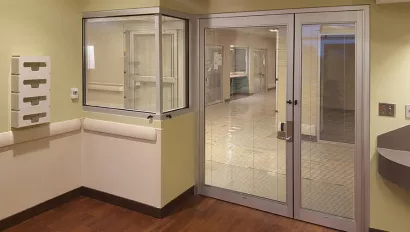Top issues you can avoid in your auto-slider door specifications
Putting together a solid set of specifications for your project can be time-consuming. (And a bit tedious). We get that.
That’s why we’ve put together a series of articles highlighting specification issues we see here at STANLEY Access Technologies. Our goal is to help your job go as smooth as we can. This article identifies the top mistakes we see in automatic sliding door specifications. And offers you ways to avoid the mistakes on your projects.
The hidden dangers of spec writing programs
One big issue we see is the improper use of specification writing programs.
That’s not to say it’s your fault. It’s more a product of the fast-track nature of building projects today. And the inherent ease of copying and pasting specifications from project-to-project.
We commonly see two main issues:
- The specification generated by the program represents a product no manufacturer has available. Or a product that can't be made (feasibility goes beyond size).
- Adding requirements from a spec writing program that aren’t relevant to any products on the market. Or not relevant to the product representing the basis of design. An example might be the specification calls for a hurricane-rated product, but the basis of design is a non-hurricane product.
How can you avoid these issues on your projects?
Be sure to spend the little extra time doing a back-check with a manufacturer (STANLEY or other). Even downloading the typical spec from their website and using it as a guide can make sure the requirements match up.
This simple step goes a long way to mitigating the issues that could come up during construction from a bad spec.
BONUS TIP: When you find these errors or specs that aren’t feasible, reach out to your spec writing software company. Ask them to update the text in their specification.
They’re hesitant to listen to a manufacturer who finds errors. Mainly to keep the specs open to as many manufacturers as possible. However, if architects and specifiers raise these issues they’re more likely to make the changes.
Know your limits
There are manufacturing limits and recommendations for all automatic sliding door products.
For example, pull up a cut sheet on STANLEY’s website for one of our automatic sliding doors. You’ll find our “typical package dimensions” listed.
Of course, custom sizes and configurations are available, so this is a starting point.
You’ll often find a manufacturer’s typical sizes are 10-, 12-, and 14-feet wide. That’s pretty standard for a four-panel, bi-parting door with 7’ tall door panels.
However, sometimes we’ll open project plans to find 20-foot wide, bi-parting doors. With 10-foot high door panels and insulated glass.
That would certainly make a rather impressive entrance. However, bigger isn’t always better and it isn’t always possible.
As you probably know, sliding doors that are part of the building’s egress path usually need a breakaway function. This means, when you push on the door panels, they switch to a swinging function to provide a wider opening for faster exiting.
If you have huge door sizes, the weight on the door pivots can be too much. Making the door unfeasible. Even if you never use the breakaway function, consider the extreme panel weight sliding back and forth for a decade. That can lead to more maintenance or service costs for your client.
Your solution? Make sure you confirm the manufacturer’s size limits. That way you don’t have any re-design or surprises come up during or after the bidding phase of your project.
STANLEY is here to help
We hope these specification tips are helpful. Working together, we can help make your next automatic sliding door project go as smooth as possible.
As always, if there’s ever any doubt at all on your design or specifications, call your local STANLEY rep. They’ll help set you up for success as you develop your plans and specs.
If you have any other questions or you’re ready to start finding the perfect doors for your next project, you can call 1-800-7-ACCESS (1-800-722-2377) or contact your local STANLEY sales rep.




